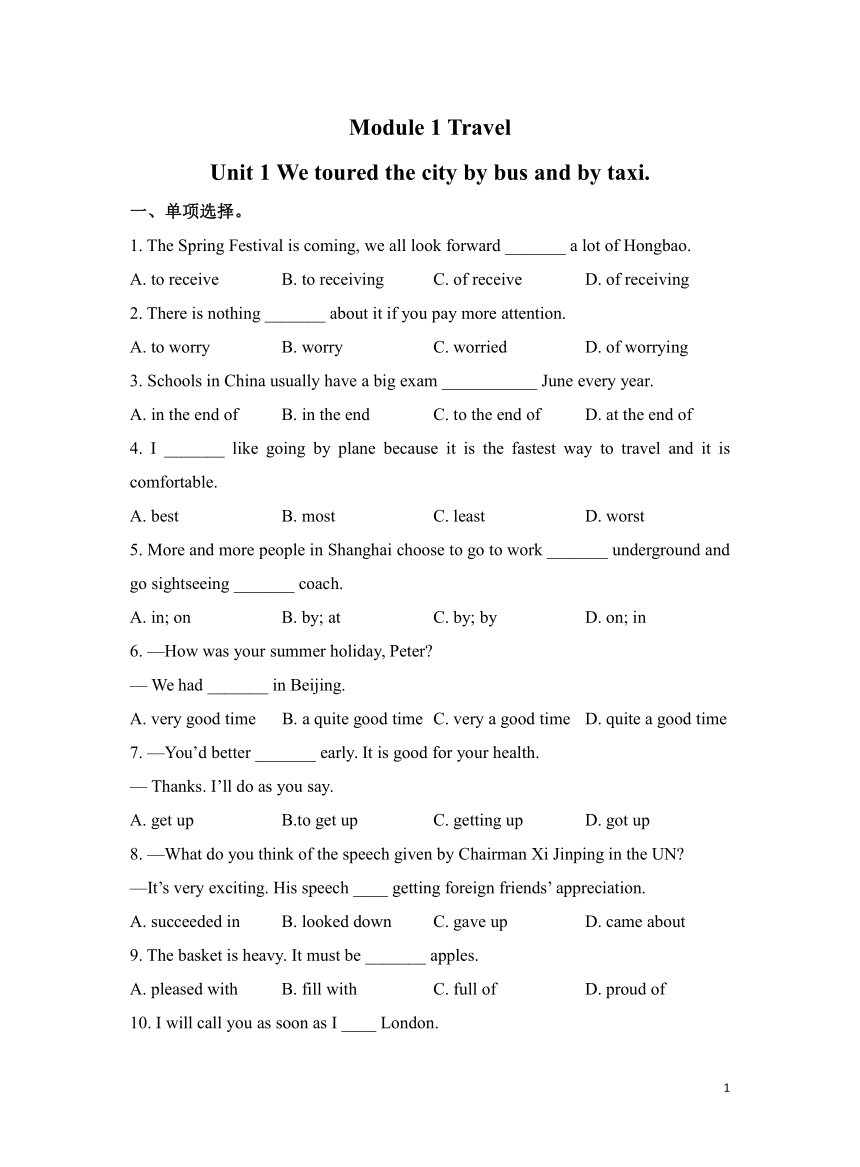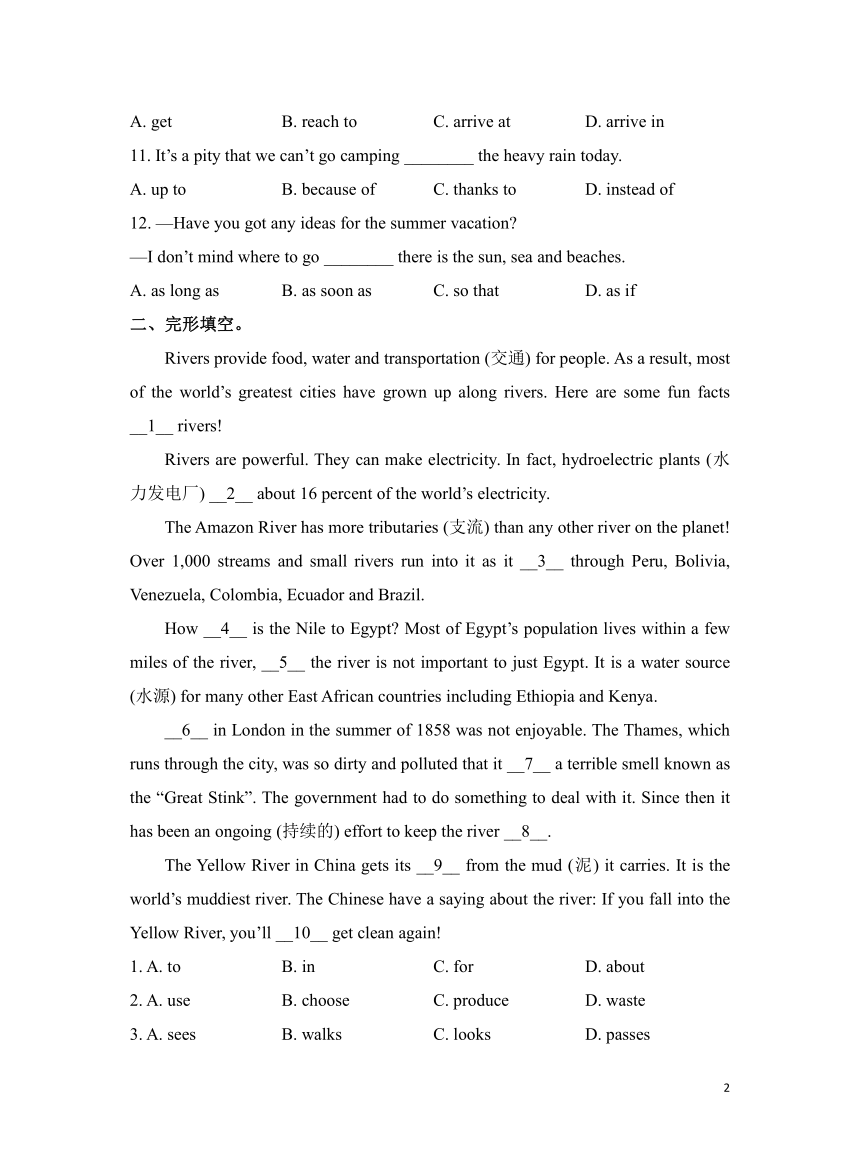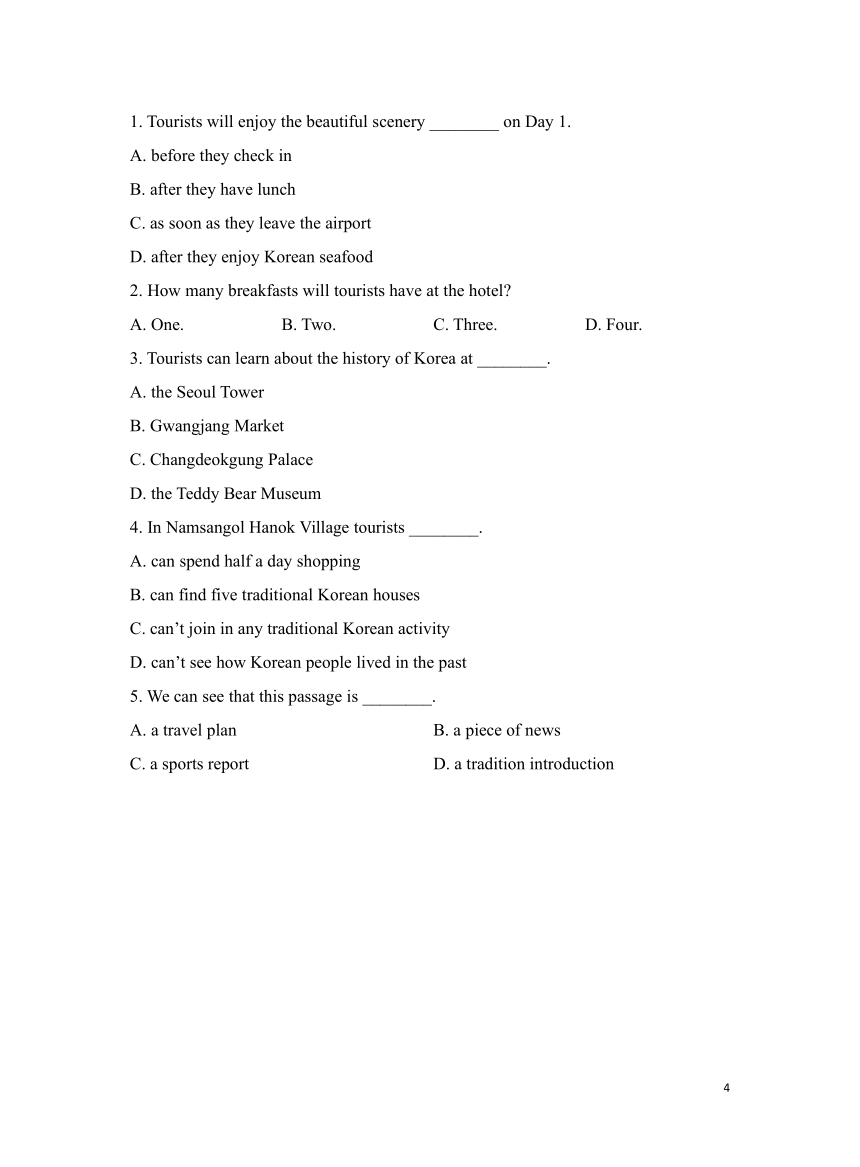外研版九下Module 1 Travel Unit 1 We toured the city by bus and by taxi作业(含解析)
文档属性
| 名称 | 外研版九下Module 1 Travel Unit 1 We toured the city by bus and by taxi作业(含解析) |

|
|
| 格式 | docx | ||
| 文件大小 | 25.0KB | ||
| 资源类型 | 教案 | ||
| 版本资源 | 外研版 | ||
| 科目 | 英语 | ||
| 更新时间 | 2023-08-30 00:00:00 | ||
图片预览




文档简介
Module 1 Travel
Unit 1 We toured the city by bus and by taxi.
一、单项选择。
1. The Spring Festival is coming, we all look forward _______ a lot of Hongbao.
A. to receive B. to receiving C. of receive D. of receiving
2. There is nothing _______ about it if you pay more attention.
A. to worry B. worry C. worried D. of worrying
3. Schools in China usually have a big exam ___________ June every year.
A. in the end of B. in the end C. to the end of D. at the end of
4. I _______ like going by plane because it is the fastest way to travel and it is comfortable.
A. best B. most C. least D. worst
5. More and more people in Shanghai choose to go to work _______ underground and go sightseeing _______ coach.
A. in; on B. by; at C. by; by D. on; in
6. —How was your summer holiday, Peter
— We had _______ in Beijing.
A. very good time B. a quite good time C. very a good time D. quite a good time
7. —You’d better _______ early. It is good for your health.
— Thanks. I’ll do as you say.
A. get up B.to get up C. getting up D. got up
8. —What do you think of the speech given by Chairman Xi Jinping in the UN
—It’s very exciting. His speech ____ getting foreign friends’ appreciation.
A. succeeded in B. looked down C. gave up D. came about
9. The basket is heavy. It must be _______ apples.
A. pleased with B. fill with C. full of D. proud of
10. I will call you as soon as I ____ London.
A. get B. reach to C. arrive at D. arrive in
11. It’s a pity that we can’t go camping ________ the heavy rain today.
A. up to B. because of C. thanks to D. instead of
12. —Have you got any ideas for the summer vacation
—I don’t mind where to go ________ there is the sun, sea and beaches.
A. as long as B. as soon as C. so that D. as if
二、完形填空。
Rivers provide food, water and transportation (交通) for people. As a result, most of the world’s greatest cities have grown up along rivers. Here are some fun facts __1__ rivers!
Rivers are powerful. They can make electricity. In fact, hydroelectric plants (水力发电厂) __2__ about 16 percent of the world’s electricity.
The Amazon River has more tributaries (支流) than any other river on the planet! Over 1,000 streams and small rivers run into it as it __3__ through Peru, Bolivia, Venezuela, Colombia, Ecuador and Brazil.
How __4__ is the Nile to Egypt Most of Egypt’s population lives within a few miles of the river, __5__ the river is not important to just Egypt. It is a water source (水源) for many other East African countries including Ethiopia and Kenya.
__6__ in London in the summer of 1858 was not enjoyable. The Thames, which runs through the city, was so dirty and polluted that it __7__ a terrible smell known as the “Great Stink”. The government had to do something to deal with it. Since then it has been an ongoing (持续的) effort to keep the river __8__.
The Yellow River in China gets its __9__ from the mud (泥) it carries. It is the world’s muddiest river. The Chinese have a saying about the river: If you fall into the Yellow River, you’ll __10__ get clean again!
1. A. to B. in C. for D. about
2. A. use B. choose C. produce D. waste
3. A. sees B. walks C. looks D. passes
4. A. interesting B. popular C. important D. dangerous
5. A. so B. but C. if D. because
6. A. Work B. Life C. Weather D. Education
7. A. gave out B. gave up C. took out D. took out
8. A. clean B. dirty C. long D. short
9. A. shape B. name C. size D. smell
10. A. only B. never C. just D. soon
三、阅读理解。
A trip to Seoul, South Korea (韩国)
Day 1
Our guide will meet you at Incheon International Airport (仁川国际机场) in the morning. Check in (登记入住) at the five-star King Hotel. Then have lunch at a famous Korean restaurant in the city centre. Enjoy the beautiful scenery (风景) at the Banpo Bridge over the Han River. It turns into beautiful colours at night. And then enjoy Korean seafood near the river.
Day 2
Have breakfast at the hotel. Visit the Seoul Tower and the Teddy Bear Museum near the hotel. Have famous chicken soup for lunch. After lunch, go to Changdeokgung Palace, a great place to learn about the history of Korea. In the evening, visit Gwangjang Market, which is famous for all kinds of Korean street food.
Day 3
After breakfast at the hotel, drive to Namsangol Hanok Village. There are five traditional Korean houses there. Tourists can see how Korean people lived in the past. Also, join in traditional Korean activities. Enjoy traditional Korean food at Korea House.
Day 4
Drive to Dongdaemun Market early in the morning and spend half a day shopping. Drive to the airport and fly back to Shanghai.
1. Tourists will enjoy the beautiful scenery ________ on Day 1.
A. before they check in
B. after they have lunch
C. as soon as they leave the airport
D. after they enjoy Korean seafood
2. How many breakfasts will tourists have at the hotel
A. One. B. Two. C. Three. D. Four.
3. Tourists can learn about the history of Korea at ________.
A. the Seoul Tower
B. Gwangjang Market
C. Changdeokgung Palace
D. the Teddy Bear Museum
4. In Namsangol Hanok Village tourists ________.
A. can spend half a day shopping
B. can find five traditional Korean houses
C. can’t join in any traditional Korean activity
D. can’t see how Korean people lived in the past
5. We can see that this passage is ________.
A. a travel plan B. a piece of news
C. a sports report D. a tradition introduction
参考答案与解析
一、单项选择。
1. B
【解析】句意:春节快到了,我们都盼望着能收到很多红包。短语“look forward to doing sth.”:盼望做某事,期待做某事;故选B。
2. A
【解析】句意:如果你多加注意,没什么好担心的。考查动词不定式。There is sth. to do/be这是英语常用的句型结构,sth.是不定代词,后面的不定式作定语,修饰sth.;所以“there is nothing”后可接动词不定式作定语;故选A。
3. D
【解析】句意:中国的学校通常在每年6月底举行一次大型考试。
考查介词短语。in the end:终于,最后,副词短语;in the end of在……结束的时候,介词短语;to the end of到……的尽头,介词短语;at the end of在……尽头,在……末端,介词短语。根据常识可知“中国的学校通常在每年6月底举行一次大型考试”,故选D。
4. B
【解析】句意:我最喜欢坐飞机,因为这是最快的旅行方式,而且很舒服。
考查副词最高级。best最好;most最;最多;极其;least最小;最少;worst最坏,最糟。根据下文“因为这是最快的旅行方式,而且很舒服。”可知“我最喜欢坐飞机”。短语most like sth.=like sth. best最喜欢……;故选B。
5. C
【解析】句意:在上海,越来越多的人选择乘地铁去上班,乘长途客车去观光。考查介词辨析。in在……里面;on在……上面;by通过、被,表示方式;at在。underground (地铁)和coach (长途客车)都是交通工具,表示“乘坐某种交通工具”用介词by,“by+交通工具”构成介词短语,表示交通方式,故答案选C。
6. D
【解析】句意:——彼得,你的暑假过得怎么样?——我们在北京玩得很开心。考查动词的固定搭配和副词辨析。have a good time是固定短语,意为“玩得很高兴”,所以排除A选项。very和quite二者都是程度副词,用于修饰形容词或副词,但语气和用法不同。very同形容词连用修饰名词时,若有a/an要置于a/an之后,意为“非常、很”,所以排除C选项;quite同形容词连用修饰名词时,如果是单数可数名词带有a/an,quite要放在冠词a/an的前面,构成quite a/an,所以排除B选项;故答案选D。
7. A
【解析】句意:——你最好早点起床。这有益于你的身体健康。——谢谢。我会照你说的做的。考查固定搭配。A. get up起床,动词原形;B. to get up动词不定式;C. getting up动名词及现在分词;D. got up过去式及过去分词。根据You’d better _______ early,可知本题考查了had better的用法:had better do sth.最好做某事,后面跟的是动词原形。故答案选A。
8. A
【解析】考查动词短语辨析。句意:“你如何看待习近平主席在联合国发表的演讲?”“它很令人激动。他的演讲获得了外国友人的赏识。” succeeded in成功;looked down俯视;gave up放弃;came about发生。根据语境可知A项符合。
9. C
【解析】句意:这个篮子很重,它一定装满了苹果。be pleased with对……满意;be full of充满,装满;be proud of以……为荣。be filled with充满。B错误。结合句意可知,答案为C。
10. D
【解析】词语辨析法。get作“抵达,到达”讲时,是不及物动词,后面不能直接接地点名词;reach是及物动词,后面可直接接地点名词,不用加介词; arrive是不及物动词,后面不能直接接地点名词,其后跟大的地点用in,跟小地点用at,London是大城市,故选D。
11. B
【解析】短语辨析法。up to意为“能胜任”;because of意为“因为,由于”; thanks to意为“多亏”;instead of意为“代替”。结合句意“很遗憾,因为大雨我们今天不能去露营了。”可知应选B。
12. A
【解析】A. as long as只要,引导条件状语从句 B. as soon as一……就……,引导时间状语从句。C. so that以便,目的是,引导目的结果状语从句。D. as if似乎,好像,一般引导表语从句。根据题意:你对暑假有什么想法吗?只要有阳光、大海和海滩,我不介意去哪里。故答案选A。
二、完形填空。
【解析】本文介绍了有关河流的一些有趣的事实。
1. D句意:以下是一些关于河流的有趣事实!to朝向;in在……里面;for为了;about大约,关于。根据some fun fact和rivers之间的联系可知之间应该填about,表示“关于”。故选D。
2. C句意:事实上,水力发电厂的发电量占世界总发电量的16%。use使用;choose选择;produce生产;waste浪费。根据“about 16 percent of the world’s electricity”可知,表示“发出电”,应该使用produce。故选C。
3. D句意:在流经秘鲁、玻利维亚、委内瑞拉、哥伦比亚、厄瓜多尔和巴西的过程中,有1000多条溪流和小型河流流入。see看见;walk步行;look看;pass通过,经过。根据“Over 1,000 streams and small rivers”和“through ...”可知该处意思是亚马逊河“流经”秘鲁、玻利维亚、委内瑞拉等国家。故选D。
4. C句意:尼罗河对埃及有多重要?interesting有趣的;typical典型的;important重要的;dangerous危险的。由下句中的not important just to Egypt可知该空填important。故选C。
5. B句意:大多数埃及人口生活在离尼罗河几英里的范围内,但尼罗河不仅仅对埃及重要。so所以;but 但是;unless除非;because因为。前后两个分句呈转折关系,所以该空填but。故选B。
6. B句意:1858年夏天在伦敦的生活并不愉快。work工作;life生活;weather天气;education教育。由下句可知那年夏天泰晤士河臭气熏天,所以当时伦敦的“生活”不太好过。故选B。
7. A句意:贯穿整个城市的泰晤士河(泰晤士河)脏兮兮、污染严重,散发出一种被称为“恶臭味”的可怕气味。give out散发;give up放弃;take out拿出;take up占据。由前面的dirty和polluted可知,该处表示发出一种“令人不快的”气味。故选A。
8. A句意:从那时起,一直在努力保持河流的清洁。clean干净的;dirty脏的;long长的;short短的。根据上句“The government had to do something to deal with it.”可知,为了保持泰晤士河的“干净”,自此开始了一场持久不懈的努力。故选A。
9. B句意:中国的黄河因其携带的泥沙而得名。shape形状;name名字;size尺寸;smell味道。因为泥沙是黄的,所以黄河由此得名。故选B。
10. B句意:如果你掉进黄河,你就再也洗不干净了!ever曾经;never从不;just仅仅;soon不久。本句是一句中国谚语“跳进黄河也洗不清”可知,该空应该填never,故选B。
三、阅读理解。
【解析】本文介绍的是韩国首尔之旅的行程安排。
1. B细节理解题。根据第一段中“Check in (登记入住) at the five-star King Hotel. Then have lunch at a famous Korean restaurant in the city centre. Enjoy the beautiful scenery (风景) at the Banpo Bridge over the Han River.”可知,是在午餐后 欣赏美丽的风景。故选:B。
2. B细节理解题。根据第二段中“Have breakfast at the hotel. Visit the Seoul Tower and the Teddy Bear Museum near the hotel.”和第三段中“After breakfast at the hotel, drive to Namsangol Hanok Village.”可知,一共在酒店吃两顿早餐。故选:B。
3. C细节理解题。根据第二段中“After lunch, go to Changdeokgung Palace, a great place to learn about the history of Korea”可知,长德宫是一个学习韩国历史的好地方。故选C。
4. B细节理解题。根据第三段中“After breakfast at the hotel, drive to Namsangol Hanok Village. There are five traditional Korean houses there. Tourists can see how Korean people lived in the past.”可知,在南山阁韩屋村,那里有五所传统的韩国房子,游客可以看到韩国人过去的生活。故选:B。
5. A推理判断题。A. 一个旅行计划;B. 一则新闻;C. 体育新闻;D. 一个传统的介绍。根据内容可知,本文介绍的是韩国首尔之旅的行程安排。所以推测可能会在旅行计划上看到。故选:A。
1
Unit 1 We toured the city by bus and by taxi.
一、单项选择。
1. The Spring Festival is coming, we all look forward _______ a lot of Hongbao.
A. to receive B. to receiving C. of receive D. of receiving
2. There is nothing _______ about it if you pay more attention.
A. to worry B. worry C. worried D. of worrying
3. Schools in China usually have a big exam ___________ June every year.
A. in the end of B. in the end C. to the end of D. at the end of
4. I _______ like going by plane because it is the fastest way to travel and it is comfortable.
A. best B. most C. least D. worst
5. More and more people in Shanghai choose to go to work _______ underground and go sightseeing _______ coach.
A. in; on B. by; at C. by; by D. on; in
6. —How was your summer holiday, Peter
— We had _______ in Beijing.
A. very good time B. a quite good time C. very a good time D. quite a good time
7. —You’d better _______ early. It is good for your health.
— Thanks. I’ll do as you say.
A. get up B.to get up C. getting up D. got up
8. —What do you think of the speech given by Chairman Xi Jinping in the UN
—It’s very exciting. His speech ____ getting foreign friends’ appreciation.
A. succeeded in B. looked down C. gave up D. came about
9. The basket is heavy. It must be _______ apples.
A. pleased with B. fill with C. full of D. proud of
10. I will call you as soon as I ____ London.
A. get B. reach to C. arrive at D. arrive in
11. It’s a pity that we can’t go camping ________ the heavy rain today.
A. up to B. because of C. thanks to D. instead of
12. —Have you got any ideas for the summer vacation
—I don’t mind where to go ________ there is the sun, sea and beaches.
A. as long as B. as soon as C. so that D. as if
二、完形填空。
Rivers provide food, water and transportation (交通) for people. As a result, most of the world’s greatest cities have grown up along rivers. Here are some fun facts __1__ rivers!
Rivers are powerful. They can make electricity. In fact, hydroelectric plants (水力发电厂) __2__ about 16 percent of the world’s electricity.
The Amazon River has more tributaries (支流) than any other river on the planet! Over 1,000 streams and small rivers run into it as it __3__ through Peru, Bolivia, Venezuela, Colombia, Ecuador and Brazil.
How __4__ is the Nile to Egypt Most of Egypt’s population lives within a few miles of the river, __5__ the river is not important to just Egypt. It is a water source (水源) for many other East African countries including Ethiopia and Kenya.
__6__ in London in the summer of 1858 was not enjoyable. The Thames, which runs through the city, was so dirty and polluted that it __7__ a terrible smell known as the “Great Stink”. The government had to do something to deal with it. Since then it has been an ongoing (持续的) effort to keep the river __8__.
The Yellow River in China gets its __9__ from the mud (泥) it carries. It is the world’s muddiest river. The Chinese have a saying about the river: If you fall into the Yellow River, you’ll __10__ get clean again!
1. A. to B. in C. for D. about
2. A. use B. choose C. produce D. waste
3. A. sees B. walks C. looks D. passes
4. A. interesting B. popular C. important D. dangerous
5. A. so B. but C. if D. because
6. A. Work B. Life C. Weather D. Education
7. A. gave out B. gave up C. took out D. took out
8. A. clean B. dirty C. long D. short
9. A. shape B. name C. size D. smell
10. A. only B. never C. just D. soon
三、阅读理解。
A trip to Seoul, South Korea (韩国)
Day 1
Our guide will meet you at Incheon International Airport (仁川国际机场) in the morning. Check in (登记入住) at the five-star King Hotel. Then have lunch at a famous Korean restaurant in the city centre. Enjoy the beautiful scenery (风景) at the Banpo Bridge over the Han River. It turns into beautiful colours at night. And then enjoy Korean seafood near the river.
Day 2
Have breakfast at the hotel. Visit the Seoul Tower and the Teddy Bear Museum near the hotel. Have famous chicken soup for lunch. After lunch, go to Changdeokgung Palace, a great place to learn about the history of Korea. In the evening, visit Gwangjang Market, which is famous for all kinds of Korean street food.
Day 3
After breakfast at the hotel, drive to Namsangol Hanok Village. There are five traditional Korean houses there. Tourists can see how Korean people lived in the past. Also, join in traditional Korean activities. Enjoy traditional Korean food at Korea House.
Day 4
Drive to Dongdaemun Market early in the morning and spend half a day shopping. Drive to the airport and fly back to Shanghai.
1. Tourists will enjoy the beautiful scenery ________ on Day 1.
A. before they check in
B. after they have lunch
C. as soon as they leave the airport
D. after they enjoy Korean seafood
2. How many breakfasts will tourists have at the hotel
A. One. B. Two. C. Three. D. Four.
3. Tourists can learn about the history of Korea at ________.
A. the Seoul Tower
B. Gwangjang Market
C. Changdeokgung Palace
D. the Teddy Bear Museum
4. In Namsangol Hanok Village tourists ________.
A. can spend half a day shopping
B. can find five traditional Korean houses
C. can’t join in any traditional Korean activity
D. can’t see how Korean people lived in the past
5. We can see that this passage is ________.
A. a travel plan B. a piece of news
C. a sports report D. a tradition introduction
参考答案与解析
一、单项选择。
1. B
【解析】句意:春节快到了,我们都盼望着能收到很多红包。短语“look forward to doing sth.”:盼望做某事,期待做某事;故选B。
2. A
【解析】句意:如果你多加注意,没什么好担心的。考查动词不定式。There is sth. to do/be这是英语常用的句型结构,sth.是不定代词,后面的不定式作定语,修饰sth.;所以“there is nothing”后可接动词不定式作定语;故选A。
3. D
【解析】句意:中国的学校通常在每年6月底举行一次大型考试。
考查介词短语。in the end:终于,最后,副词短语;in the end of在……结束的时候,介词短语;to the end of到……的尽头,介词短语;at the end of在……尽头,在……末端,介词短语。根据常识可知“中国的学校通常在每年6月底举行一次大型考试”,故选D。
4. B
【解析】句意:我最喜欢坐飞机,因为这是最快的旅行方式,而且很舒服。
考查副词最高级。best最好;most最;最多;极其;least最小;最少;worst最坏,最糟。根据下文“因为这是最快的旅行方式,而且很舒服。”可知“我最喜欢坐飞机”。短语most like sth.=like sth. best最喜欢……;故选B。
5. C
【解析】句意:在上海,越来越多的人选择乘地铁去上班,乘长途客车去观光。考查介词辨析。in在……里面;on在……上面;by通过、被,表示方式;at在。underground (地铁)和coach (长途客车)都是交通工具,表示“乘坐某种交通工具”用介词by,“by+交通工具”构成介词短语,表示交通方式,故答案选C。
6. D
【解析】句意:——彼得,你的暑假过得怎么样?——我们在北京玩得很开心。考查动词的固定搭配和副词辨析。have a good time是固定短语,意为“玩得很高兴”,所以排除A选项。very和quite二者都是程度副词,用于修饰形容词或副词,但语气和用法不同。very同形容词连用修饰名词时,若有a/an要置于a/an之后,意为“非常、很”,所以排除C选项;quite同形容词连用修饰名词时,如果是单数可数名词带有a/an,quite要放在冠词a/an的前面,构成quite a/an,所以排除B选项;故答案选D。
7. A
【解析】句意:——你最好早点起床。这有益于你的身体健康。——谢谢。我会照你说的做的。考查固定搭配。A. get up起床,动词原形;B. to get up动词不定式;C. getting up动名词及现在分词;D. got up过去式及过去分词。根据You’d better _______ early,可知本题考查了had better的用法:had better do sth.最好做某事,后面跟的是动词原形。故答案选A。
8. A
【解析】考查动词短语辨析。句意:“你如何看待习近平主席在联合国发表的演讲?”“它很令人激动。他的演讲获得了外国友人的赏识。” succeeded in成功;looked down俯视;gave up放弃;came about发生。根据语境可知A项符合。
9. C
【解析】句意:这个篮子很重,它一定装满了苹果。be pleased with对……满意;be full of充满,装满;be proud of以……为荣。be filled with充满。B错误。结合句意可知,答案为C。
10. D
【解析】词语辨析法。get作“抵达,到达”讲时,是不及物动词,后面不能直接接地点名词;reach是及物动词,后面可直接接地点名词,不用加介词; arrive是不及物动词,后面不能直接接地点名词,其后跟大的地点用in,跟小地点用at,London是大城市,故选D。
11. B
【解析】短语辨析法。up to意为“能胜任”;because of意为“因为,由于”; thanks to意为“多亏”;instead of意为“代替”。结合句意“很遗憾,因为大雨我们今天不能去露营了。”可知应选B。
12. A
【解析】A. as long as只要,引导条件状语从句 B. as soon as一……就……,引导时间状语从句。C. so that以便,目的是,引导目的结果状语从句。D. as if似乎,好像,一般引导表语从句。根据题意:你对暑假有什么想法吗?只要有阳光、大海和海滩,我不介意去哪里。故答案选A。
二、完形填空。
【解析】本文介绍了有关河流的一些有趣的事实。
1. D句意:以下是一些关于河流的有趣事实!to朝向;in在……里面;for为了;about大约,关于。根据some fun fact和rivers之间的联系可知之间应该填about,表示“关于”。故选D。
2. C句意:事实上,水力发电厂的发电量占世界总发电量的16%。use使用;choose选择;produce生产;waste浪费。根据“about 16 percent of the world’s electricity”可知,表示“发出电”,应该使用produce。故选C。
3. D句意:在流经秘鲁、玻利维亚、委内瑞拉、哥伦比亚、厄瓜多尔和巴西的过程中,有1000多条溪流和小型河流流入。see看见;walk步行;look看;pass通过,经过。根据“Over 1,000 streams and small rivers”和“through ...”可知该处意思是亚马逊河“流经”秘鲁、玻利维亚、委内瑞拉等国家。故选D。
4. C句意:尼罗河对埃及有多重要?interesting有趣的;typical典型的;important重要的;dangerous危险的。由下句中的not important just to Egypt可知该空填important。故选C。
5. B句意:大多数埃及人口生活在离尼罗河几英里的范围内,但尼罗河不仅仅对埃及重要。so所以;but 但是;unless除非;because因为。前后两个分句呈转折关系,所以该空填but。故选B。
6. B句意:1858年夏天在伦敦的生活并不愉快。work工作;life生活;weather天气;education教育。由下句可知那年夏天泰晤士河臭气熏天,所以当时伦敦的“生活”不太好过。故选B。
7. A句意:贯穿整个城市的泰晤士河(泰晤士河)脏兮兮、污染严重,散发出一种被称为“恶臭味”的可怕气味。give out散发;give up放弃;take out拿出;take up占据。由前面的dirty和polluted可知,该处表示发出一种“令人不快的”气味。故选A。
8. A句意:从那时起,一直在努力保持河流的清洁。clean干净的;dirty脏的;long长的;short短的。根据上句“The government had to do something to deal with it.”可知,为了保持泰晤士河的“干净”,自此开始了一场持久不懈的努力。故选A。
9. B句意:中国的黄河因其携带的泥沙而得名。shape形状;name名字;size尺寸;smell味道。因为泥沙是黄的,所以黄河由此得名。故选B。
10. B句意:如果你掉进黄河,你就再也洗不干净了!ever曾经;never从不;just仅仅;soon不久。本句是一句中国谚语“跳进黄河也洗不清”可知,该空应该填never,故选B。
三、阅读理解。
【解析】本文介绍的是韩国首尔之旅的行程安排。
1. B细节理解题。根据第一段中“Check in (登记入住) at the five-star King Hotel. Then have lunch at a famous Korean restaurant in the city centre. Enjoy the beautiful scenery (风景) at the Banpo Bridge over the Han River.”可知,是在午餐后 欣赏美丽的风景。故选:B。
2. B细节理解题。根据第二段中“Have breakfast at the hotel. Visit the Seoul Tower and the Teddy Bear Museum near the hotel.”和第三段中“After breakfast at the hotel, drive to Namsangol Hanok Village.”可知,一共在酒店吃两顿早餐。故选:B。
3. C细节理解题。根据第二段中“After lunch, go to Changdeokgung Palace, a great place to learn about the history of Korea”可知,长德宫是一个学习韩国历史的好地方。故选C。
4. B细节理解题。根据第三段中“After breakfast at the hotel, drive to Namsangol Hanok Village. There are five traditional Korean houses there. Tourists can see how Korean people lived in the past.”可知,在南山阁韩屋村,那里有五所传统的韩国房子,游客可以看到韩国人过去的生活。故选:B。
5. A推理判断题。A. 一个旅行计划;B. 一则新闻;C. 体育新闻;D. 一个传统的介绍。根据内容可知,本文介绍的是韩国首尔之旅的行程安排。所以推测可能会在旅行计划上看到。故选:A。
1
同课章节目录
- Module 1 Travel
- Unit 1 We toured the city by bus and by taxi
- Unit 2 It's a long story.
- Unit 3 Language in use
- Module 2 Education
- Unit 1 They don't sit in rows.
- Unit 2 What do I like best about school?
- Unit 3 Language in use
- Module 3 Life now and then
- Unit 1 They sometimes work harder.
- Unit 2 I think life is better today.
- Unit 3 Language in use.
- Module 4 Rules and suggestions
- Unit 1 You must be careful of falling stones.
- Unit 2 we must keep the camp clean.
- Unit 3 Language in use.
- Revison A
- Module 5 Look after yourself
- Unit 1 We'd better get you to hospital.
- Unit 2 Get off the sofa!
- Unit 3 Language in use.
- Module 6 Eating togethe
- Unit 1 When is the school-leavers' party?
- Unit 2 Knives and forks are used for most Western
- Unit 3 Language in use
- Module 7 English for you and me
- Unit 1 Have you ever been to an English corner?
- Unit 2 We all own English.
- Unit 3 Language in use
- Module 8 My future life
- Unit 1 Here's to our friendship and the future
- Unit 2 I know that you will be better at maths.
- Unit 3 Language in use
- Revison B
